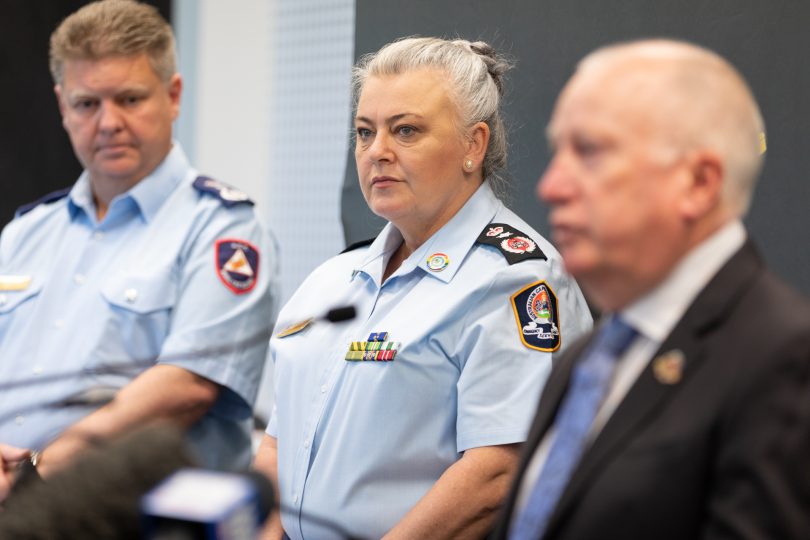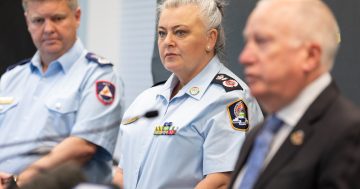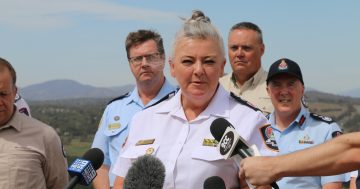
Emergency Services Minister Mick Gentleman (front right) has previously expressed his full confidence in ESA Commissioner Georgeina Whelan (centre). Photo: Michelle Kroll.
A “chaotic environment” with a “culture of blame and fear”, lack of trust among executives, no coherent vision for the future and bullying – these are just some of the criticisms of the Emergency Services Agency’s (ESA) executive leadership in a new report.
The tensions in the leadership were put under the microscope by former Ambulance Victoria CEO Tony Walker ASM, who completed his review in June.
Seen by Region, the report highlighted that while there was “no question” the services within the ESA worked together effectively in emergencies, the collaboration and collegiality on the frontline didn’t always extend to the day-to-day operations of the agency.
“Stakeholders described an at times chaotic environment with a culture of blame,” Prof Walker wrote in the report.
“There is a consistently reported lack of trust amongst the executives which [has] impacted the agency.”
More than 65 individual stakeholders were consulted during the process, with many expressing a “strong appetite for change” across the agency. However, they reported the culture was driving many skilled people to leave.
Many reported the executive level demonstrating behaviours inconsistent with agency values, including cases of withholding information, undermining decisions, blaming and bullying, including by exclusion.
“The executive are not unified … in some cases, examples were given where they appear to actively inhibit cooperation between services and with enabling services,” Prof Walker noted.
“It will take a significant commitment from the entire leadership team as well as time to rebuild this trust.”
Who the executive leadership team consisted of was not defined in the report.
A 2021 staff survey identified 20 per cent of ESA staff had personally experienced bullying, and 19 per cent had witnessed it happen to someone else. The 2023 staff survey results are due for release soon.
Another area of concern was confusion across the agency about the responsibilities of roles from the commissioner down.
Prof Walker heard the structure of the enabling agencies “apparently changes regularly”, with no comprehensive organisational chart to guide people where to go.
“Further, changes which are not effectively communicated have reportedly resulted in resentment, particularly when some areas feel understaffed and perceive other areas are given additional resources,” he wrote.
“Across the board, confusion about responsibility and accountability for priorities is causing tension.
“Delegation within the executive group seems unclear at times. In some cases this appears to be due to a lack of confidence or trust.”
There were some positives identified, such as the executive’s strong commitment to diversity, equality and inclusion.
Unions have called on an independent government representative to implement the recommendations, stating Emergency Services Minister Mick Gentleman’s previous statements of full confidence in Commissioner Georgeina Whelan meant he wasn’t the best person for the job.
United Firefighters Union ACT branch secretary Greg McConville called on Chief Minister Andrew Barr or Attorney General Shane Rattenbury to implement the changes to give the community confidence the review would be handled “fairly and objectively”.
“When it was announced the review was underway, the Minister [Gentleman] jumped the gun and said the Commissioner had his full support … [he said the same] when a staff survey from 2017 identified ESA had a toxic culture,” Mr McConville said.
“Staff need to have confidence their voices are being heard at the highest levels of government … in essence [given Mr Gentleman’s previous comments] it’s a bit of a conflict of interest issue.”
Mr McConville stopped short of calling for the commissioner or Mr Gentleman to step down, but he highlighted this report had brought back into the fore concerns that had been around for six years and still hadn’t been addressed.
Ultimately he said he was disappointed by the recommendations, stating what was really needed was proper administration and enforcement of current regulatory measures applicable to all public servants.
“If there are problems with culture and behaviour, there are legislative instruments that can be applied by the government, investigations of poor conduct can be done by the Public Service Standards Commissioner,” he said.
“If they have been done, they’ve been done so secretively that we don’t know about them.”
The report made 18 recommendations to address three elements under leadership – set direction, motivate people and develop people – which all required action and attention.
Recommendations made included having a senior human resources support presence in the agency, developing a leadership charter and strategic plan, clarifying executive-level roles and responsibilities, and creating targets for workforce performance agreements and training.
Prof Walker also recommended an implementation oversight committee be set up to monitor the changes, report progress every six months and evaluate change after two years.
Mr Gentleman said he had been made aware of the report’s findings earlier this week, but said it was a “public service administration matter”.
“There are of course concerning findings in the report, which is why implementation of the recommendations and culture change in the ESA is so important,” he said.
“I am confident this work can be successfully undertaken in collaboration with staff, stakeholders and under the leadership of the Justice and Community Safety Directorate.”
The Justice and Community Safety Directorate (JACS) has accepted all of the recommendations outlined in the report.
However, Mr McConville said what really needed to happen was for the ESA to redefine its role.
“The ESA should not be an operational service. It should stop trying to cast itself as that,” he said.
“It should return to being an administration and coordination body that supports and enables the accountability of the chief officers to the Minister, the Legislative Assembly and, in turn, the public.”




















